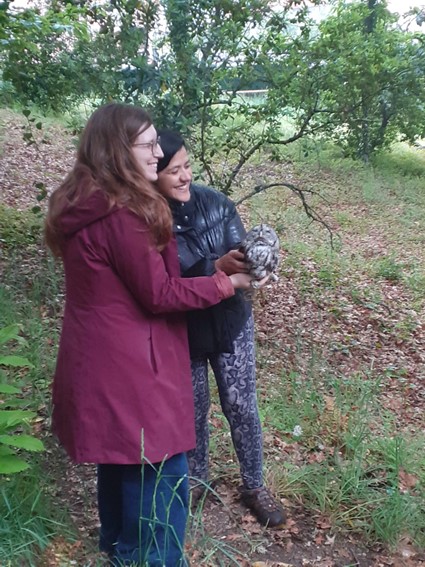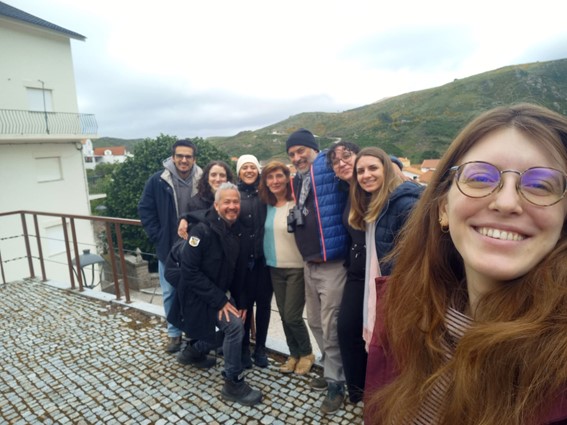By: Verónica Policarpo
The golden hour
Under the golden hour light, the green of the trees seems deeper and magical. It sparkles. We walk silently up a path covered with leaves from last Autumn’s season. There are footprints from wild boars, and we all bend to watch them closely, a mix of curiosity and fascination. We finally settle near a path leading to a thicker grove of trees. Ricardo Brandão, the coordinator of CERVAS, the Centro de Ecologia, Recuperação e Vigilância de Animais Selvagens, in Gouveia (central Portugal), lays down the box he carries. Inside, a small tawny owl crouches in motionless silence. This member of the Strix aluco family arrived at CERVAS a couple of months before, injured, where he was cared for by the center’s team. What does it mean to take care of another living being so that recovery from trauma and disaster is possible? How can we look into the marvel of another living being in their recovery process? How can we turn the awe we feel into humble learning?
With confident hands, Ricardo invites us to hold the small tawny owl before setting him free into the wild. One needs to learn how to hold gently, finding a delicate balance between holding on and letting go. This seems to be the secret of caring relationships. One of us holds the feet, the other the small body, all silk-like smoothness. We can feel the gentle beat of the small heart. Suddenly, the head turns and the big eyes look straight at us. In that particular moment, as Derrida described about his cat, we connect deeply to the singular subjectivity of this animal. We can feel his fear. We can feel his desire for freedom. We can attune to his power. We then follow Ricardo’s instructions: by holding him gently but firmly, we finally release him and watch him fly towards the high canopies of the forest. There is a moment of deep and meaningful silence. We are united in a kind of gravitas and sense of wonder.

The ABIDE project: learning from animals how to recover from disasters
This moment, which took place in May 2024, during a retreat of the ABIDE Team in Serra da Estrela, somehow encapsulates our shared purpose in project ABIDE: to attune to the experiences of animals and other-than-human beings, in an effort to understand their worlds and creative processes of recovery from wildfires. The project is funded by an Advanced Research Grant of the European Research Council and will run between 2023 and 2028 at the Human-Animal Studies Hub and ICS-ULisboa. As explained in our website, the acronym ABIDE “stands for dwelling, abiding, abode, a place of living. It represents symbolically the aspiration to build a safe place for multispecies cohabitation, one where both human and nonhuman animals may all live together, cooperate and flourish.”
We start this journey with an overarching question, which hopefully will open new avenues of enquiry. We want to know how animals recover from catastrophic wildfires, in order to include them, their experiences, and perspectives in a new model of multispecies governance of disasters. We are driven by scientific curiosity, empathic engagement, and ethical care. We seek to understand more about how animals reoccupy the territory and the more-than-human maps they contribute to build in that process. We are curious about their relationships with other animals, including humans. About their entanglements with plants and other more-than-human agents. We aim to explore their multiple modes of resistance to adverse conditions, their creative practices, and the meanings they convey through them. Additionally, we seek to understand how traditional and indigenous knowledge addresses them and the management of fire.
The project unfolds in four different phases: i) exploring the narratives of animals in disasters, in policy documents and the media; ii) observing how animals are recovering, through multispecies ethnography and geographic mapping; iii) storying and reconstituting multispecies and animals’ biographies of post-disaster landscapes – what we call zoegraphies of disaster; and iv) engaging with multilevel stakeholders to co-produce and test our pilot in multispecies governance of disasters. We focus on three countries that have been severely affected by extreme fires over the last decades: Australia, Brazil and Portugal. In each country, we will work in particular “more-than-human contact zones”, where we expect to engage with the local and/or indigenous communities, acknowledging ancient ways of relating to the more-than-human worlds.
In our endeavour, we aim at making our nonhuman kin full partners in research. We need to give them back the agency and recognition that was always theirs, even though ignored and unacknowledged. We aim at building a kind of knowledge that surpasses speciesist barriers. To that purpose, we need to learn how to listen to nonhumans differently, and cultivate new ways of paying attention to their ways of being and living. We need to get out of our comfort zone and venture into worlds that are unfamiliar to us – and that is really their beauty… And we also need to hold our more-than-human-partners, and their experiences, gently and with compassion, combining knowledge and ethics in order to provide a safe space for all.
The ABIDE Family: facing the challenges of interdisciplinarity heads on
To address these challenges, we are armoured with the best tool of all: a team made of highly motivated researchers, in several stages of career, from different scientific backgrounds: anthropology, geography, conservation biology, visual arts, multispecies ethnography, ecology, communication, sociology. Our strength lies in the plural languages we speak and the capacity to turn them into a real and fruitful dialogue. For that, we train ourselves to listen to each other authentically. This requires humbleness, a willingness to get out of our epistemological comfort zones and dare to learn from each other, and from the animals we work with. It also requires that we support each other, while taking responsibility for oneself. That is why we often refer to ourselves as a “family” rather than a team. We invest so much of ourselves into making this project happen that we can only reach the other side of this process transformed. Which certainly resonates with the ultimate goal of ABIDE: to contribute to build a world where all animals, human and nonhuman, may flourish.

Verónica Policarpo is a Human-Animal Studies scholar, and a Senior Research Fellow at the Institute of Social Sciences, University of Lisbon, where she currently coordinates the project ERC ABIDE, the Human-Animal Studies Hub and the post-graduate course Animais e Sociedade.
The Project ERC ABIDE – Animal ABidings: recoverIng from DisastErs in more-than-human communities is funded by the European Research Council, European Union (ERC, ABIDE, CoG ID 101043231). More information about the project and the team available at https://abide.ics.ulisboa.pt. Views and opinions expressed are however those of the author only and do not necessarily reflect those of the European Union or the European Research Council Executive Agency. Neither the European Union nor the granting authority can be held responsible for them.